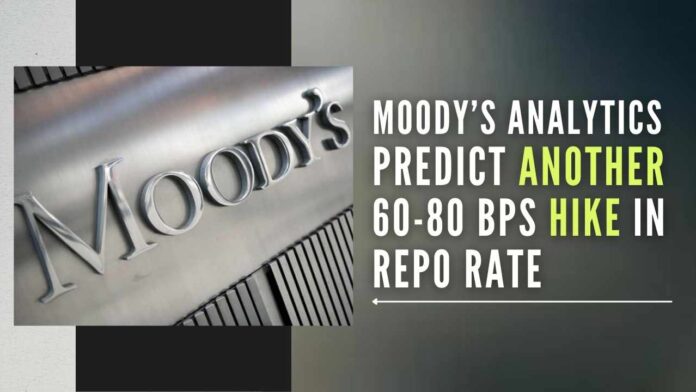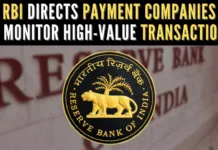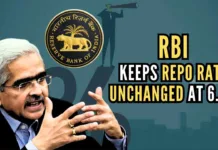
Expect another hike in repo rate says Moody’s Analytics
Soon after the Reserve Bank of India (RBI) raised key lending rates, or repo rate, by 50 basis points to 4.9 percent, the global financial services company Moody’s Analytics said the Central Bank could hike the repo rate by another 60 to 80 basis points through the rest of the year.
Wednesday’s repo rate hike followed a surprise off-cycle rate hike of 40 basis points in May that broke a pandemic-driven pause on interest rates and marked the first hike since August 2018.
Moody’s Analytics, however, maintained that these rate increases will need to be carefully calibrated to meet the Central Bank’s increasingly difficult objectives of supporting growth and taming inflation. The lastest hike of 50 basis points was marginally above its expectations of a 40-basis point rate hike, Moody’s said in a report.
“High costs from elevated and volatile global oil prices, higher input costs owing to industry-specific shortages, trade restrictions as a consequence of Russia’s invasion of Ukraine, and a domestic heat wave have driven up consumer prices,” the report said.
Quoting the Central Bank, the report said that although domestic demand had gained some traction and the economy remained resilient in the face of these headwinds, inflation pressures have become more broad-based and that upside risks to inflation have “materialized earlier than anticipated”.
It added that fiscal measures announced in May, including excise duty cuts on fuels, increased subsidies on certain imported raw materials and cooking gas, and export restrictions on sugar and wheat, are intended to aid in tackling inflation.
“However, it’s unlikely that these measures can do much to moderate inflation. And given that select food, grain, and vegetable supplies could see continued volatility before stabilizing, a substantial cooling is not expected. Further, the impending pickup in goods and services spending will add to demand-driven pressures and aggravate price increases in coming months.”
The months ahead will likely see more fiscal and monetary policy coordination to mitigate the overall inflation hit to economic growth, the report added.
India’s retail inflation has been above RBI’s 6 percent tolerance level for four months in a row, while wholesale inflation in the country has been double-digit for over a year now.
India’s retail inflation is likely to stay above the tolerance level of 6 percent till the third quarter of FY23 before moderating below 6 percent, said Reserve Bank of India Governor Shaktikanta Das on Wednesday in his remarks on the outcome of the monetary policy review meeting.
For FY23, RBI sees overall inflation at 6.7 percent, with 7.5 percent in Q1, 7.4 percent in Q2, 6.2 percent in Q3, and 5.8 percent in Q4, taking into consideration the normal monsoon and average crude oil basket price of $105 per barrel.
Coming to growth, India’s real GDP growth in FY23 is seen at 7.2 percent, with 16.2 percent in Q1, 6.2 percent in Q2, 4.1 percent in Q3, and 4.0 percent in Q4, with risks broadly balanced, Das said.
[With Inputs from IANS]
PGurus is now on Telegram. Click here to join our channel and stay updated with all the latest news and views
For all the latest updates, download PGurus App.
- Delhi: Stir over Biryani served on plates with Bhagwan Shri Ram’s image - April 23, 2024
- Rajasthan: PM Modi launches scathing attack on Congress; says ‘My 90-Sec Speech Created Panic’ - April 23, 2024
- Delhi Court extends Arvind Kejriwal, K Kavitha’s judicial custody till May 7 in money laundering case - April 23, 2024










